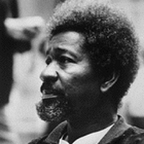FX issues: What’s the way out
Like the popular Peter Obi meme that passes around, this whole piece reeks of getting “advice from a madman". It comes with a caveat that “please don’t try this at home". A lot of Nigerians are worried about the state of the Nigerian currency. We must face the fact that prior to 2015, Nigerian currency was a store of value. Recently, it has stopped being so for every Titi, Amina and Chibuzor. A currency can’t keep losing value in the “black market" and not face credibility issues. I guess folks in CBN have given up on this or the arbitrage is too sweet for the insiders and why put a gravy train to a halt? Let me unpack a few things I feel might change the dynamics.
If our currency found relative stability in the 2011–2015 window, it’s because CBN with huge FX earnings had the firepower to intervene. Well, the gross incompetence of the current government in the face of recent high oil prices means it’s not able to do so. So we must accept some truth, we must bold to allow the Nigerian currency to find its true value (it can even be N1200 to USD) rather than this disparate two-tier system.
I had an experience recently. If I upgraded my seat to the Premium Economy class in the US, I paid $300 (the equivalent of N210,000 in my mind). I tried to do the same thing in Nigeria, I was charged N133,000. It felt really good and when you think of the arbitrage for PTA/BTA, it’s just a colossal waste of scarce resources.
My own idea is to end the two-tier system by creating a market of willing sellers and valid buyers. Let me explain. There’s no sense in withdrawing FX in cash from the bank or paying remittances in FX. This is the fuel for the parallel market. Every bank customer that needs his or her FX should be sent to the market for open sale. Let everyone participate in an open FX market that allows them to sell their FX holdings. It’s like creating a stock market for FX with the invisible hand of CBN. CBN would be a keen watcher of the market and provide monetary stability as it could. I know this exists currently but let’s bring things to reality, it’s not working. Let’s assume that the rate is N825 in the open market, CBN can intervene so that the rate improves to N800 by injecting rapid FX.
I spoke of valid buyers. CBN can have a vetting system to ascertain Form A, import bills, and trading partners and use a two-week window at most for validation. The CBN can also partner with an education payment platform like Flywire for school remittances and payments for BTA/PTA can be paid into cards. CBN can also issue virtual cards valid for online subscriptions. This can be modified to ensure smooth access services and still avoid a run on Naira. This means you discontinue this discounted BTA/PTA regime. Let everyone apply through the window receive funds in a physical/virtual card that’s available for offshore use.
The fear for me is the fuel pump price if you subject FX requirements for import to the open market price. I think if FX rates get to N800, then you might play with the landing price of petrol at N900. The subsidy costs would be unthinkable. The way out might be for NNPC to continue its crude allocations for exchanges and pay for crude value at the fixed price of N400. It might be the social cost of things, eventhough this is still sub-optimal.
As I stated in my book, an exchange rate is just the price, an agreement between sellers and buyers. It reflects the level of productivity in a country. If we can’t pump oil production at record levels nor accelerate non-oil exports by finding markets and easing the process, we don’t have any entitlement to a strong currency.
This is the existential question that must be knocked into the heads of our leaders. However, we know that Nigeria is a rentier state where its elite are trying to hollow its resources for private gain. On matters of productivity levels, a rentier culture can’t change the dynamics; it’s about commitment to work. Our currency is bound to be weaker unless we find purposeful leadership that plans a medium/long-term game — what will Nigeria sell to the world apart from oil, how does it optimise its extractive industry and what are the new growth poles that can attract foreign capital?
To diagnose this as an economic issue is to miss the point, it is mostly a political one. Every approach leaves a loophole that banks and even CBN can severely undermine for personal gains. So, is there really a solution without committed ethical leadership and a strong consequence framework? I am afraid, there’s none.
